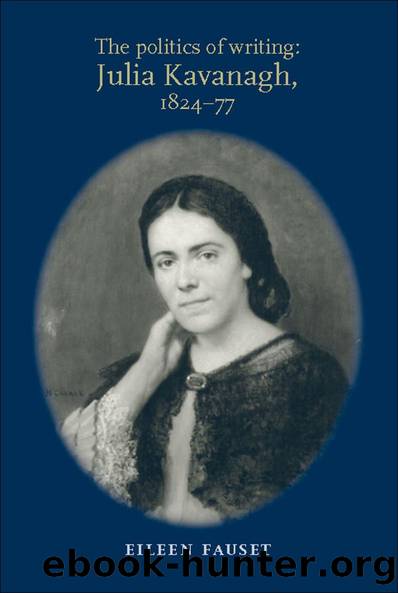The politics of writing: Julia Kavanagh, 1824â77 by Eileen Fauset

Author:Eileen Fauset [Fauset, Eileen]
Language: eng
Format: epub
Tags: Literary Collections, Essays, Social Science, Women's Studies, Literary Criticism, General
ISBN: 9781847795267
Google: vXa5DwAAQBAJ
Publisher: Manchester University Press
Published: 2013-07-19T03:35:37+00:00
4
French Women of Letters and English Women of Letters
French Women of Letters and its companion volume, English Women of Letters, are Kavanaghâs testimony to the progress and achievements in womenâs writing during the previous two hundred years. Both volumes were published in 1862, twelve years after Woman in France during the Eighteenth Century, and, as she states in her preface to English Women of Letters:
Both are parts of one whole, conceived and written at the same time, and with the same object â namely, âto show how far, for the last two centuries and more, women have contributed to the formation of the modern novel in the two great literatures of modern times â the French and the English.â
Womenâs lives, and women writers particularly, never ceased to fascinate Kavanagh. She believed wholeheartedly that the novel was an important means of expression for women; as she states in the final paragraph of English Women of Letters, âIt is the only branch of literature in which women have acquired a genuine distinction and exercised undoubted influenceâ. She maintains that during the past two hundred years the French novel has held precedence in Europe as the most popular, adding that it may have been abused, even hated, but it has always been read.1 The English novel, she claims, is less universally fascinating but more durable. She attributes a change in the novel over the previous seventy years or so to the influence of women who, she implies, extended a sense of âtruthâ in the telling of a plain tale. To this end she applies the term âdelicacyâ. In the context of the mid-nineteenth-century concept of sexual difference, Kavanagh makes it clear that in her regular usage of this term she is, in fact, addressing the literary developments that took place during the period about which she was writing. In Writing Womenâs Literary History (1996) Margaret Ezell notes that âBetween 1675 and 1875, there were at least twenty-five biographical encyclopedias and anthologies specifically devoted to chronicling the lives and labours of literary Englishwomenâ, all of which establish an ideology of the âfeminineâ.2 She reminds us that in Kavanaghâs literary history the term âdelicacyâ had evolved from earlier eighteenth-century usage to represent âthe primary standard of literary merit for women writersâ. However, she contends that in English Women of Letters, Kavanagh âfaces the charge that nineteenth-century novels suffer from overrefinement because of the domination of female authorsâ. And, as such, she maintains that Kavanagh âturns to the history of the novel seeking solutionsâ.3 I would suggest that Ezellâs argument is too reductive in that it fails to accommodate a wider understanding of Kavanaghâs purpose. Though Kavanaghâs perspective is one of gender difference, she does not singularly reflect a historically received allegiance to the ideal of âfeminineâ, as Ezell suggests, but also determines a political position. By the end of the eighteenth century, delicacy of tone in womenâs writing had become the accepted norm.4 Kavanagh utilises the word in terms of understanding womenâs contribution to the
Download
This site does not store any files on its server. We only index and link to content provided by other sites. Please contact the content providers to delete copyright contents if any and email us, we'll remove relevant links or contents immediately.
Asking the Right Questions: A Guide to Critical Thinking by M. Neil Browne & Stuart M. Keeley(5751)
Autoboyography by Christina Lauren(5222)
Eat That Frog! by Brian Tracy(4514)
Dialogue by Robert McKee(4385)
Sticky Fingers by Joe Hagan(4185)
Journeys Out of the Body by Robert Monroe(3610)
Annapurna by Maurice Herzog(3463)
Full Circle by Michael Palin(3442)
Schaum's Quick Guide to Writing Great Short Stories by Margaret Lucke(3368)
Elements of Style 2017 by Richard De A'Morelli(3336)
The Art of Dramatic Writing: Its Basis in the Creative Interpretation of Human Motives by Egri Lajos(3058)
Atlas Obscura by Joshua Foer(2946)
Why I Write by George Orwell(2944)
The Diviners by Libba Bray(2926)
The Fight by Norman Mailer(2923)
In Patagonia by Bruce Chatwin(2919)
The Mental Game of Writing: How to Overcome Obstacles, Stay Creative and Productive, and Free Your Mind for Success by James Scott Bell(2896)
Venice by Jan Morris(2568)
The Elements of Style by William Strunk and E. B. White(2469)
